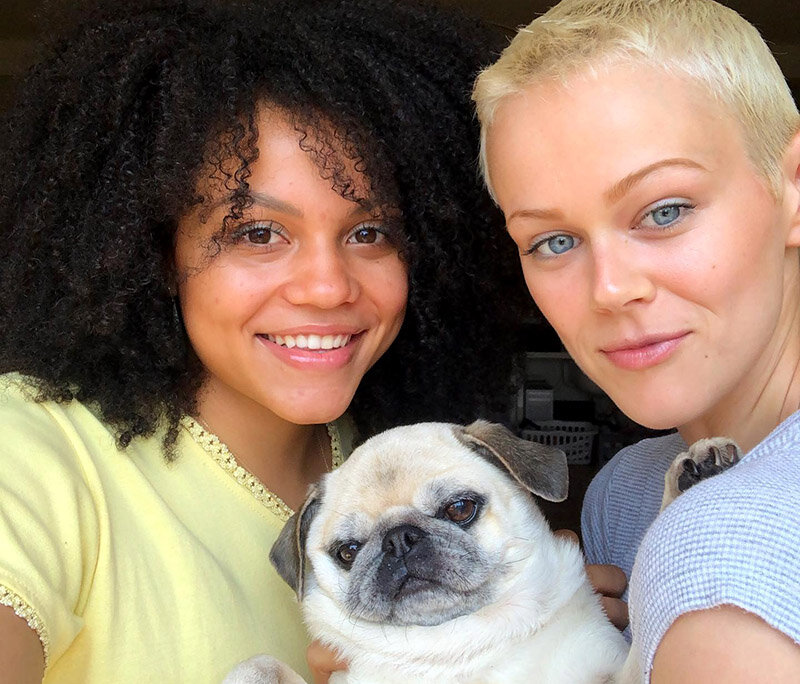Phoenix Community Garden is thrilled to be collaborating with VIV Nourish on a year-long healing group for survivors of intimate partner violence. The program will incorporate both gardening and film-making. It is open to people of all gender expressions. Above, Adeija Jones, filmmaking coordinator, and Maria Elsbeth Polzin, program coordinator, dare to share the frame with a pug.
How do you define intimate partner violence?
Intimate partner violence stems from the term ‘domestic violence.’ Domestic violence implies that it’s happening in the home, but violence can happen anywhere. In recent legal cases, it’s been expanded to include violence that happens in families and in non-sexual relationships, or in any relationship in which the victim feels they were close to the individual and harmed in a way that’s similar to traditional domestic violence. As we move towards a more survivor-centered narrative, we move towards the autonomy of the victim to lay claim over what intimacy and intimate partner means to them.
I’d like to discuss the word ‘victim.’ As a gay man who lived through the AIDS crisis, our movement worked to curtail the use of the label for people living with HIV because it can be disempowering. What are your thoughts on the use of that term?
Personally, I gravitate towards the word ‘survivor’ for that same reason. That’s why three years ago I started Survivors Magazine. I found it so valuable to my own healing process to be able to claim an identity outside of victimhood and explore what survivorship means to me. But I haven’t completely expelled ‘victim’ from my vocabulary because I’ve gotten feedback from other survivors that they don’t always feel that survivor is the best label for them and their trauma. So, I make clear that it’s an option.
What is the connection between intimate partner violence and food?
I first saw this connection when I was doing research in Cape Town, South Africa on food gardening. I was creating a documentary and conducting a lot of long form interviews. I became close with the participants in my research. Some of them began to disclose to me violence in their home and by intimate partners. Specifically, the ways that the partner might use food as a tool of violence. For instance, expecting dinner to be on the table when they come home. Or dictating what they can or cannot cook or buy at the grocery store. Or not giving them money for food.
At the same time, every participant found that food was a vital part of their healing and their growth. I began to see the nuances of food—how talking about it made some of the participants so much more open to talking about their relationships because it was a palatable, if you will, entry into the topic.
What is your personal stake in the issue?
I originally entered the world of combatting gender-based violence, to use a broader umbrella of violence, as a survivor of sexual violence. I realized that the term intimate partner violence applied to me because I had relationships with both men that harmed me. I’ve begun to accept the nuanced ways that violence has affected my intimate relationships, not just my sexual relationships. My experiences affected my own relationship with food. I’ve looked at the ways that I nourished my body during peaks of my mental health and how I used food in my lowest points of mental health. Moving forward, I’m able to more consciously use food as a tool to empower myself.
What is the goal of the program?
The goal the VIV Nourish team is two-fold. It is through and through a community engagement and capacity building program. We want people to leave the program with the tools to empower and nourish themselves through food and also be able to tell their stories through film. We will cultivate the community that already exists in the area and understand the needs so that as individuals with resources we can better meet them. And we hope to influence policy and funding towards the intersection between food gardening and intimate partner violence. There’s very little research on this topic. So we have to create our own research, and who better to do that than the community members themselves.
What will be happening in the program?
Each program will include a short film making lesson, a short gardening lesson, then an opportunity to work in the garden and apply those tools that they’re learning and whatever interests they may have in the physical land. In the winter months, when it’s too cold to work in the garden, we will meet indoors and conduct workshops on things like cooking, fabric dyeing, medicinal herbs and oils—all the other fun stuff that you can do inside. At the end, we’ll have a public event where we can screen the short documentaries that participants make and share our favorite recipes with the public. We are prioritizing accessibility, so should individuals need single-ride Metrocards or childcare we are prepared to provide that.

